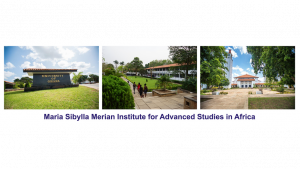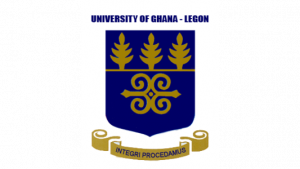Individual MIASA Fellowships at the University of Ghana
DOUBLON
The Merian Institute for Advanced Studies in Africa (MIASA) offers
Up to 10 Individual Residential Fellowships
for 3-12 months each at the University of Ghana
(for the academic year 2022/2023)
Application deadline: 15 November 2021, 24 h UTC
The Maria Sibylla Merian Institute for Advanced Studies in Africa (MIASA) is dedicated to research in the Humanities and Social Sciences, with ‘Sustainable Governance’ as its central topic. Our main thematic corridors are conflict and sustainable peace, democracy and environmental transformation. We are also interested in a wide range of intersectional sub-topics, such as landownership and acquisition, migration and mobility, restitution of cultural objects, African cities, human rights and other related themes. MIASA is committed to reduce global asymmetries in knowledge production, to promote female scholarship and to bridge cultural divides. The institute offers time and space for supporting innovative academic projects of top international quality. MIASA serves as a hub for exchange, networking and collaboration amongst leading researchers from Germany, Ghana, Africa, Europe and elsewhere in the world. The institute is located on the beautiful campus of the University of Ghana (UG) at Legon (Accra), and has been implemented in collaboration with the University of Freiburg, the Goethe University of Frankfurt, the German Institute for Global and Area Studies (GIGA) and the German Historical Institute Paris (GHIP). It is largely funded by the German Federal Ministry of Education and Research.
The present call is for up to ten (10) individual residential fellowships for 3-12 months each for the academic year 2022/2023. The starting date of a fellowship is generally handled flexibly, however, for fellowships between three and six months we strongly encourage the following:
o Twelve-months fellowships usually start in August.
o Four- and six-months fellowships are usually offered during the period between August and January and between January and June.
o Three-months fellowships are usually offered from 1st of June to 31st of August.
The call is open to both junior (> 6 years after completion of PhD) and senior (> 6 years after completion of PhD) researchers.
Individual residential fellowships will allow researchers to conduct a project of their own choice, connected to MIASA’s thematic research areas. Projects can be at conceptional stage, mid-term phase or final stage (analyzing data, writing up findings). The selection is made by MIASA’s distinguished international Academic Advisory Board. In a strictly merit-based selection process, the individual fellowships are awarded to researchers of top academic quality with an innovative and high-quality research topic. The all-important selection criteria are the academic excellence of the applicant and the fellowship proposal. MIASA is committed to inclusion, gender equality, and family friendliness. The MIASA fellowship program thus aims for gender parity and is promoting affirmative action policies.
The Institute supports academic exchange across existing boundaries: between disciplines, between different cultures and countries, between established and younger researchers. Furthermore, MIASA engages in activities opening the research community to society, politics, and the arts. Individual fellows are part of this community, and profit from the lively research environment of the university. Applications for individual fellowships should indicate how the research project contributes to the academic life at MIASA and the University of Ghana.
Fellowship
The successful applicants become MIASA fellows with all the corresponding rights and obligations for the requested funding period. Fellows affiliated with a home institution may choose between two fellowship options: (1) The fellows’ salary or teaching substitution costs are met by MIASA for every full fellowship month on the principle of “no loss, no gain,” and paid directly to his/her home institution. (2) A fellow may choose the option of an individual grant based on the candidate’s salary at his/her home institution.
Additionally, fellows from outside Accra may receive a monthly living allowance of up to 675€.
Non-affiliated fellows receive an individual monthly grant.
For all fellows from outside Accra, MIASA provides accommodation (or an equivalent accommodation allowance of up to 1500€/month) and reimburses travel costs. In addition, a small contribution to support research undertaken at MIASA can be granted to the MIASA fellow upon application to MIASA directors (max. 250€/ fellow month). MIASA fellows who come with family members to Accra can receive a family allowance. Fellowships are funded by the German Federal Ministry for Education and Research via the University of Freiburg/FRIAS.
The Institute provides its fellows with office space on the University of Ghana campus. Fellows have full access to all library services at the University of Ghana and, electronically, at the University of Freiburg, Germany. A full-time presence of fellows at MIASA for the entire fellowship period is required. Periods of leave need to be negotiated with the MIASA directors prior to the signing of the fellowship agreement, and must not exceed a total of more than 1/6 of the fellowship duration.
Application
Applications will be accepted in English and French. The completed application form together with the information indicated below have to be uploaded on the application webpage (https://mobility.frias.uni-freiburg.de/mobility/BewerbungServlet?identifier=FRIAS&kz_bew_pers=L&kz_bew_art=IN&aust_prog=MIASAone&sprache=en). After submission of the documents, applicants receive an acknowledgement of receipt providing contact details and including a copy of their submission. Incomplete or late applications will not be considered.
Please respect formal requirements:
o Formatting: font Arial, 11 pt, line spacing 1.5, all margins 2.5 cm.
o Page limits may not be exceeded.
o All required documents have to be comprised in one pdf-file and uploaded on the application webpage.
Applications must include the following information:
1. Front page with general information on the applicant (1 page):
a. Title, name (last, first), e-mail address, link to webpage.
b. Date of doctorate.
c. Current position/affiliation, institution and business address (name of institution/city/country). Please indicate if you are affiliated with a German research institution/university at the moment of application.
d. Research field.
e. Title of fellowship project.
f. Abstract of the fellowship project (max. 150 words).
g. Dates for the fellowship at MIASA for which you apply according to MIASA’s calendar.
h. The two most important reasons why you apply for a residential fellowship at MIASA.
2. Project proposal (max. 5 pages):
a. Project title (max. 50 characters).
b. Abstract of the fellowship project (150 words).
c. Aims, theoretical framework and methodology of the project.
d. Work and time plan (note: the fellowships only offer a max. of 250€/month research costs, following the guidelines of the funding institution, and it requires being present at MIASA).
e. Innovative potential, originality and relevance of the project.
f. Added value of conducting research at MIASA and the University of Ghana.
g. Bibliographical references (max. 1 page in addition to the 5 pages of the proposal).
5. CV in tabular form (max. 2 pages).
6. Publication list highlighting the most important publications (max. 2 pages).
Please note: no cover letter is required, but a front page.
Application deadline: 15 November, 2015, 24 h UTC: https://mobility.frias.uni-freiburg.de/mobility/BewerbungServlet?identifier=FRIAS&kz_bew_pers=L&kz_bew_art=IN&aust_prog=MIASAone&sprache=en
Successful candidates will be informed by March 2022.
For further information, please contact: miasa@frias.uni-freiburg.de

